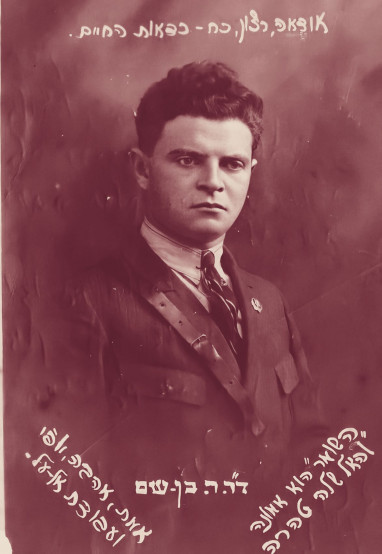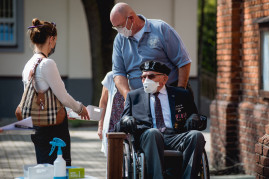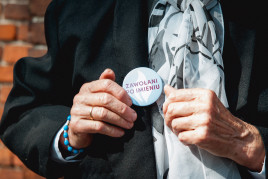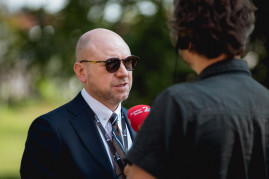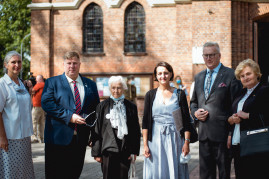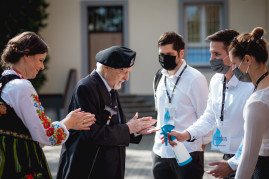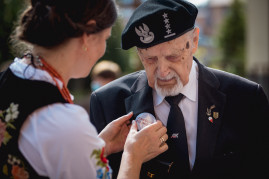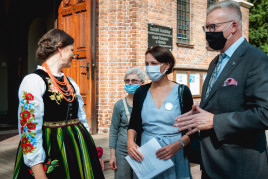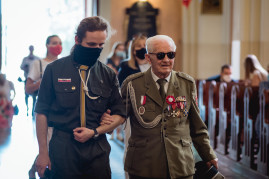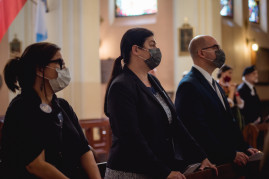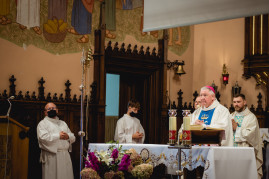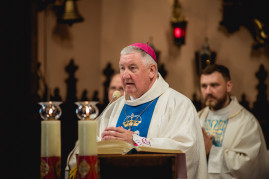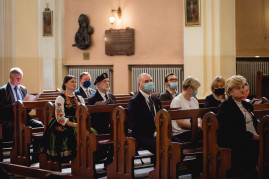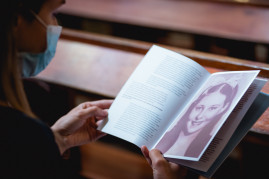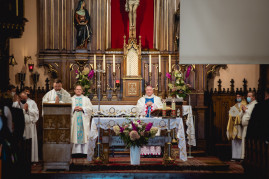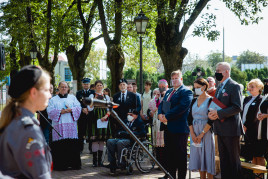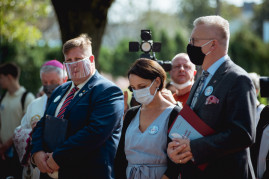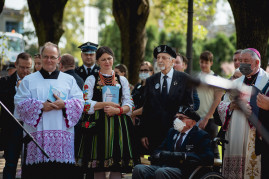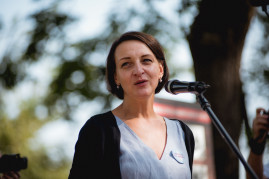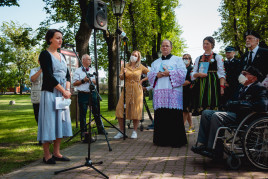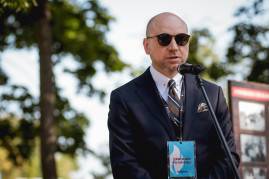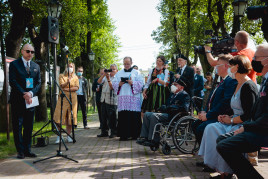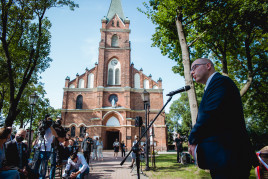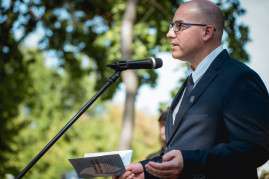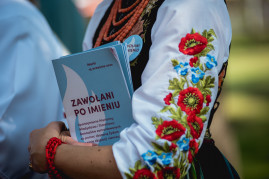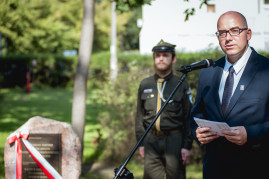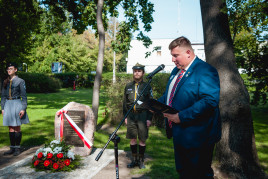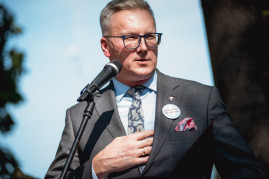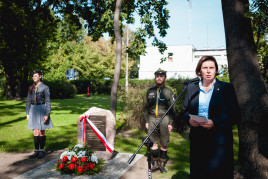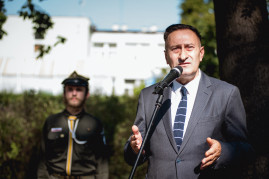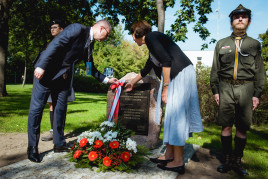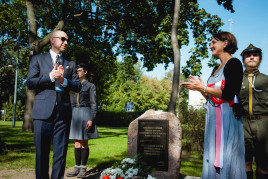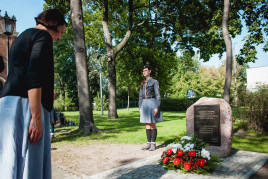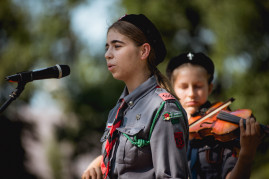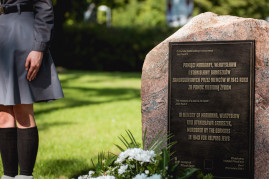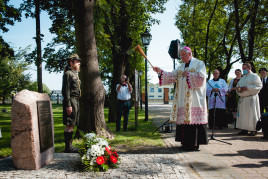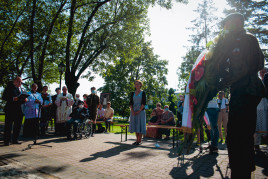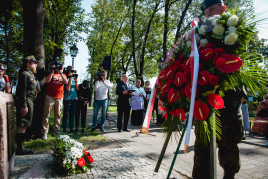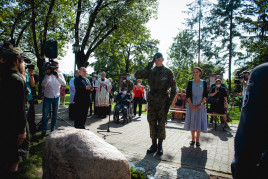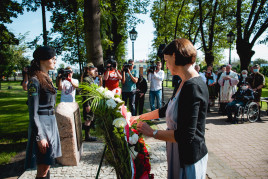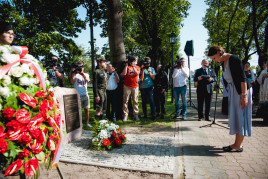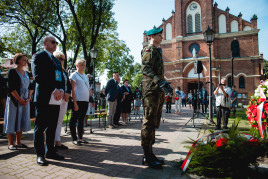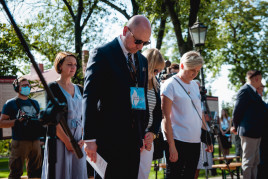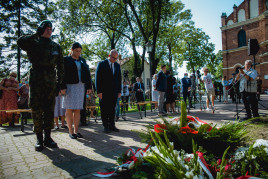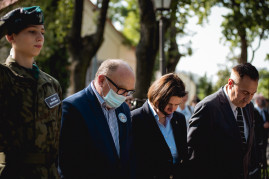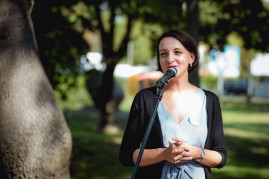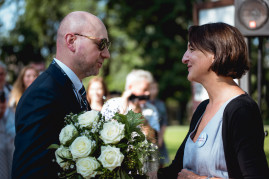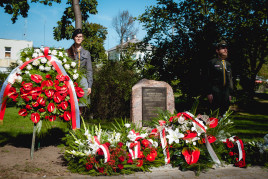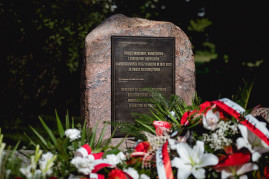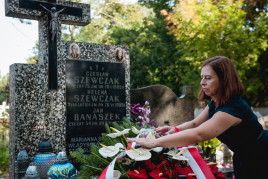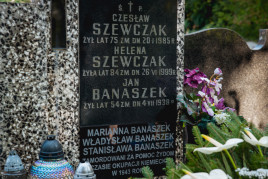A commemoration of the Banaszek Family - Instytut Pileckiego
A commemoration of the Banaszek Family
Marianna, Władysław and Stanisława Banaszek, murdered for helping Jews during the German occupation, were commemorated in Marki near Warsaw. For the first time in the history of the project, contact was established with the descendants of the Survivors.
The event was attended by Prof. Magdalena Gawin, Deputy Minister of Culture and National Heritage; Dr. Wojciech Kozłowski, Director of the Pilecki Institute; representatives of the Jewish community: Monika Krawczyk from the Union of Jewish Religious Communities in Poland and Artur Hofman, President of the Social and Cultural Association of Jews in Poland; representatives of the local government: Jacek Orych, Mayor of Marki and Adam Lubiak, Starost of Wołomin. The ceremony began with a Holy Mass at the St. Isidore Church, concelebrated by Rev. Romuald Kamiński, Bishop of the Warsaw-Praga Diocese and Rev. Kazimierz Sztajerwald, the parish priest.
“The idea behind the program is to remember that if someone gives their life for the innocent, death will undo its sentence – today we are calling Marianna, Władysław and Stanisława Banaszek by name and revoking their death sentence,” said Prof. Magdalena Gawin, Deputy Minister of Culture and National Heritage and initiator of the “Called by Name” project, before the unveiling of the commemorative plaque.
Jacek Szewczak, relative of the Banaszek family, said: “This initiative will broaden our knowledge and our perception of those tragic times. It will let us objectively consider the extreme misery suffered by all citizens of the Polish Republic, regardless of their nationality. I believe that the case of the Banaszek family can also serve as a warning and a lesson for contemporary and future generations.”
The words of Sharon Ben-Shem Da Silva, the granddaughter of the man saved by the Banaszek family, was also read out during the ceremony.
“The commemorated story is unique because for the first time we managed to find the descendants of the saved Jews. Interestingly enough, when we were searching for information about those who were hiding, the family of the saved Reuven Ben-Shem was looking for information about those who were helping. We are happy that we could meet,” said Agnieszka Dąbek from the Pilecki Institute, the scientific coordinator of the “Called by Name” project. “I had been researching the history of the Banaszek family for a long time when I finally managed to combine the knowledge of various scholars from the Pilecki Institute and thus discover a trace of one of the saved persons. That person turned out to be Rubin Feldszuh, a graduate of the Rabbinical Seminary in Vienna who was a famous writer and one of the leaders of the Zionist Movement in prewar Poland. After the war, Rabbi Feldszuh refused the office of the Chief Rabbi of Poland and moved to Israel, where he changed his name to his prewar literary pseudonym Ben-Shem, started a family and worked as a rabbi in Giv'at Shmuel, a small town not far from Tel Aviv. I managed to contact his granddaughter, Sharon Ben-Shem. This story is proof that saving Jewish neighbors who were in danger of imminent death made deep sense. Although not a single member of the Banaszek family survived the war, they are still present not only in our memory, but also in the memory of those who owe them their lives,” emphasized Agnieszka Dąbek.
“First of all, I wanted to express gratitude. It is important to show how much we appreciate each hand that was extended in help,” said Sharon Ben-Shem Da Silva, the granddaughter of the Survivor Rabbi Reuven Ben-Shem, in an online interview before the commemoration. “I believe that we are not entitled to judge other people. I do not judge those who did not offer similar help, because we cannot judge people who found themselves in such circumstances. Not everyone would be ready to put their family in danger of death. We are thus all the more grateful to the Banaszek family that they took the risk to hide my family – but also others, as they provided shelter for other people as well. This is incredible. It required great courage, as they knew that they could be punished with death. As far as I know, they provided my family not only with shelter, but also with a tender care, and they respected one another,” continued Sharon Ben-Shem Da Silva. “I do not know what would have become of my grandfather had he not found shelter with the Banaszeks. There is no doubt that they saved his life. Fortunately, he received aid later on as well – he managed to survive and move to Israel, where he started a new family, my family. I am immensely grateful and would have been very happy to meet the descendants of the Banaszeks. I know, however, of the tragic fate that befell them – and we are truly sorry. We are grateful to them, truly grateful.”
It was a 13th stone with a commemorative plaque that was unveiled as part of the Pilecki Institute’s “Called by Name” project, which was inaugurated in March 2019.
History of the Banaszek family
When the Second World War broke out, Marianna Banaszek and her teenage children – Władysław, Wiktoria and Stanisława – lived in the town of Pustelnik near Warsaw. The widow and her children often suffered hunger during the occupation, as they had to survive on the meager rations of food provided by the Germans. Looking for an additional source of income, they jointly decided to rent rooms in their house to runaways from the ghetto. Many Jews found shelter in their house, among them Abram Frank and members of the Szpak, Kossower and Felszuh families.
In autumn 1943, the Banaszeks were warned of the planned search of their house. Knowing what might happen to the Jews if they were found, Marianna helped them secretly leave their hiding place, while she and her children remained at the house. In the morning, the German gendarmes began searching the premises. Only the children were home at the time, as Marianna had gone to church. The Germans found a shelter underneath the floor, which proved that the information about the Banaszeks helping Jews must have been true. The children, Władysław and Stanisława, were taken to the brickyard in Marki, where they were executed and buried. Marianna was shot in the vestibule of her house on return from the mass. Her body was buried in the garden. According to the neighbors, Wiktoria Banaszek – who was absent from the house on the fateful day – also died at the hands of the Germans in Warsaw.
After the war, the bodies of Marianna, Władysław and Stanisława Banaszek were moved to the cemetery in Marki.
